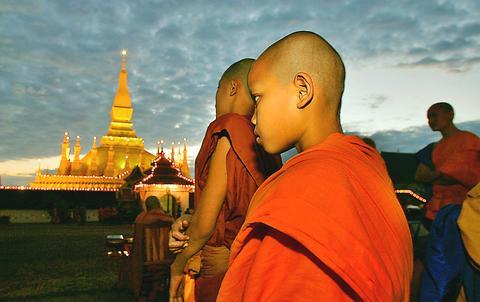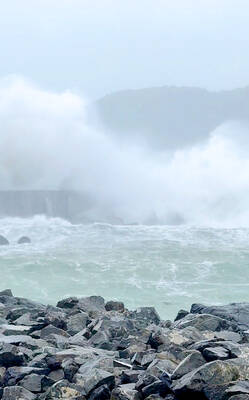Southeast Asian ministers yesterday finalized a free trade pact with China and a host of other accords to be adopted at a leaders summit, but touchy topics like the lack of democracy in Myanmar and Islamic unrest in Thailand were swept under the rug.
The Association of Southeast Asian Nations (ASEAN) meeting was a prelude to a two-day summit starting Monday of the group's 10 leaders. They also will meet separately with the heads of governments from China, Japan, South Korea, India, Australia and New Zealand.

PHOTO: AP
The summit is the first such international event for the isolated communist nation of Laos, whose prime minister joined thousands of compatriots early yesterday at a golden-spired temple in the capital to pray for a successful meeting.
"I and all the Lao people are making merit today for the prosperity of the nation and wish that Lord Buddha will bless us for the peaceful success of the summit," Prime Minister Bounnhang Vorachith told reporters.
Some 35 agreements are to be signed in Vientiane by the 16 countries including one on creating a free trade area between ASEAN and China by 2010 -- a market of nearly 2 billion people whose combined economies are worth more than US$2.4 trillion.
Agreements also will be signed to start negotiations for similar free trade areas with South Korea, Australia and New Zealand; South Korea will sign a treaty of amity and cooperation; ASEAN and India plan to sign an agreement on cooperation in political, economic, science, technology, health and cultural spheres.
ASEAN comprises Brunei, Cambodia, Indonesia, Laos, Malaysia, Myanmar, Philippines, Singapore, Thailand and Vietnam.
Concerns over violence that flared up and killed 540 people this year in Thailand's Muslim-majority south have clouded the run-up to the conference. But the topic was not raised formally by the foreign ministers and "is not on the agenda" of the summit, Lao government spokesman Yong Chanthalangsy said.
Thai Prime Minister Thaksin Shinawatra has threatened a walk-out if the Muslim unrest is raised, saying the issue is domestic only. But Southeast Asian neighbors, especially Muslim-dominated Malaysia to the south, worry the violence could destabilize the region.
"If anybody raises the issue, it is up to Thailand to respond ... and say: `Don't worry this will not affect other ASEAN countries,'" Malaysian Foreign Minister Syed Hamid said.
Frustration over Myanmar's unfulfilled pledges to introduce democracy also threatened to intrude on talks, but that too was not raised during the ministerial meeting, Yong said.
"The meeting was to prepare for the summit. Why should they concentrate on one country? There was no discussion on Myanmar," he said.
To pre-empt criticism, Myanmar's Foreign Minister Nyan Win told a news conference Friday that the junta is committed to restoring democracy despite its ouster last month of a relatively moderate prime minister, General Khin Nyunt.
But he sidestepped questions on whether pro-democracy leader Aung San Suu Kyi would be freed from house arrest.
Thai Foreign Ministry spokesman Sihasak Phuangketkeow said Myanmar's statements were "positive."
"People were pessimistic" after Khin Nyunt's removal but "statements by Myanmar leaders heard lately seem to indicate there would be no backtracking," he told reporters.
He said the Myanmar issue would not be raised by other ministers unless Nyan Win himself volunteers to report on the situation.
Another major topic was Malaysia's offer to host an "East Asia Summit" of the 10 ASEAN countries plus Japan, China and South Korea next year, said Yong. But a decision on whether to accept the offer would likely be taken at the summit level, Yong said.
Former Malaysian Prime Minister Mahathir Mohamad long wanted those countries to form a trade bloc to compete with Europe and North America.
Japan and South Korea were lukewarm because of pressure from their ally, the US.
Indonesian Foreign Ministry spokesman Marty Natalegawa said substantial meetings under the ASEAN umbrella are preferable to a "cosmetic" East Asia summit.

Heavy rain and strong winds yesterday disrupted flights, trains and ferries, forcing the closure of roads across large parts of New Zealand’s North Island, while snapping power links to tens of thousands. Domestic media reported a few flights had resumed operating by afternoon from the airport in Wellington, the capital, although cancelations were still widespread after airport authorities said most morning flights were disrupted. Air New Zealand said it hoped to resume services when conditions ease later yesterday, after it paused operations at Wellington, Napier and Palmerston North airports. Online images showed flooded semi-rural neighborhoods, inundated homes, trees fallen on vehicles and collapsed

‘COST OF DEFECTION’: Duterte’s announcement could be an effort to keep allies in line with the promise of a return to power amid political uncertainty, an analyst said Philippine Vice President Sara Duterte yesterday announced she would run for president of the Southeast Asian nation of 116 million in 2028. Duterte, who is embroiled in a bitter feud with Philippine President Ferdinand Marcos Jr, was impeached last year only to see the country’s Supreme Court throw the case out over procedural issues. Her announcement comes just days before her father, former Philippine president Rodrigo Duterte, begins a pretrial hearing at the International Criminal Court (ICC) in the Netherlands over crimes against humanity allegedly committed as part of a brutal crackdown on drugs. “I offer my life, my strength and my future

FEROCIOUS FISH-EATER Scientists have found a new species of dinosaur from the Cretaceous Period, a ‘hell heron’ that stalked the rivers, deep in the Saharan desert At a remote Sahara desert site in Niger, scientists have unearthed fossils of a new species of Spinosaurus, among the biggest of the meat-eating dinosaurs, notable for its large blade-shaped head crest and jaws bearing interlocking teeth for snaring fish. It prowled a forested inland environment and strode into rivers to catch sizable fish like a modern-day wading bird — a “hell heron,” as one of the researchers put it, considering it was about 12 meters long and weighed 5-7 tons. The dinosaur presented a striking profile on the Cretaceous Period landscape of Africa some 95 million years ago as it hunted

NOT YET THERE: While the show was impressive, it failed to demonstrate their ability to move in unstructured environments, such as a factory floor, an expert said Dancing humanoid robots on Monday took center stage during the annual China Media Group’s Spring Festival Gala, China’s most-watched official television broadcast. They lunged and backflipped (landing on their knees), they spun around and jumped. Not one fell over. The display was impressive, but if robots can now dance and perform martial arts, what else can they do? Experts have mixed opinions, with some saying the robots had limitations and that the display should be viewed through a lens of state propaganda. Developed by several Chinese robotics firms, the robots performed a range of intricate stunts, including martial arts, comedy sketches and choreographed